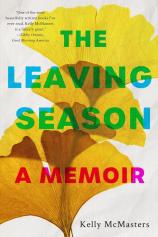The Leaving Season: A Memoir
Review
The Leaving Season: A Memoir
Even as the divorce rate in the United States is declining, the popularity of the divorce memoir remains undiminished, as evidenced by recent outstanding entries like Gina Frangello’s BLOW YOUR HOUSE DOWN and Maggie Smith’s YOU COULD MAKE THIS PLACE BEAUTIFUL. To that pair, add Kelly McMasters’ lovely, painful THE LEAVING SEASON, an elegant essay collection that traces the decline and fall of her marriage and her first tentative steps on the path to a new life.
McMasters and the man she identifies only as “R.,” an artist who specializes in oil portraits and landscapes, met at a Brooklyn diner a few months before 9/11, when she worked 90-hour weeks as a corporate legal assistant at a large Manhattan law firm and planned to attend law school. Her job placed her close enough to the Twin Towers to give her a view of people leaping from the burning buildings --- “a perfect portrait of fire” --- as she describes in the haunting essay “Intrepid.” Those events, and her realization that “a suit is not armor,” persuaded her to abandon her original plan and instead pursue an MFA at Columbia University and a writing career.
"Kelly McMasters is a graceful, fluid writer, and though the subject matter of her memoir is anything but easy, the rewards of sharing her company on the page are undeniable."
As she describes in “‘His Wife Once Bit His Hand to the Bone,’” her attraction to R. was instantaneous, evoking a feeling that “everything was swallowed by his gaze.” And yet, almost from the beginning, one senses they were a poorly matched pair, as she explains her discomfort at his refusal to allow her to pose for him. She “wanted to be the one who inspired him,” while “I don’t paint girlfriends” was his excuse.
The central setting of McMasters’ story is an 1860s farmhouse on 10 acres of land in rural northeastern Pennsylvania that she and R. purchased while they still lived about three hours away from New York City and later moved to full-time. It’s the place where their two sons were born and the couple tried to make a life together until she realized that more trying was futile.
Their home, located in an area called Rock Lake that can’t be found on any map, provides the material for some of the collection’s best essays. In “The Cow,” McMasters introduces bachelor brother farmers Pat and Tom Joe, who jokingly name one of their herd after her (the animal turned out to be a “freemartin,” or hermaphrodite sterile female calf). That story nicely segues into “The Ghosts in the Hills,” where she recounts how the brothers’ barn served as a social gathering place, and features an account of a grisly murder-suicide and a startling explanation for why she decided one day never to set foot there again.
In “The Bookshop: A Love Story,” McMasters relates the quixotic decision to open a 250-square-foot bookstore on the dying main street of tiny Honesdale, Pennsylvania (pop. 4,458). She created a successful lecture series that brought well-known writers to the town, but R. abandoned his plan to start an artist’s print shop in the space and essentially turned his back on the project. He expected his wife would simply add her work at the bookstore to child care and her other jobs, including part-time teaching and freelance writing, while he focused on his painting, which only intermittently produced any meaningful income.
Eventually, the couple’s rural life became financially untenable, but as McMasters explains in her typically nuanced style, her relief at selling the ramshackle farmhouse after a dozen years was mingled with deep sadness as she left the place where she “felt closest to the possibility of finding happiness.” When she finally threw in the towel, she departed with the two boys for a one-year teaching assignment in Lancaster, Pennsylvania (“Our Castle Year”), and then on to another creative writing post on Long Island (“Finding Home”), where they remain today. McMasters isn’t interested in portraying R. as a villain, although her description in “The Stone Boat” of a painting he made of the boys is unnerving. But even as her determination to initiate the divorce is tinged with regret, she leaves little doubt where she believes the fault for the marriage’s failure lies (“Slowly, piece by piece, and then all at once”).
McMasters’ writing shares some of its DNA with the work of Leslie Jamison and Rebecca Solnit, who appears in “Finding Home.” She excels at apt metaphors, like the shrinking garden at the Pennsylvania home that becomes a symbol for the creeping demise of her marriage. In “Still Life 3: The Suburbs,” a description of the teeming contents of her car reflects both the loving disorder of her life and her resilience in the face of life’s obstacles. And as her marriage falters and fails, she wonders how R. “could study the human face for so long and not be able to see the one closest to him,” one of her aching epiphanies that at times grab the heart and at others stab it.
THE LEAVING SEASON is a candid, often wrenching account of a relationship’s slow, inexorable crumbling and a survivor’s attempt to climb from the ruin and build a new life. Kelly McMasters is a graceful, fluid writer, and though the subject matter of her memoir is anything but easy, the rewards of sharing her company on the page are undeniable.
Reviewed by Harvey Freedenberg on May 12, 2023
The Leaving Season: A Memoir
- Publication Date: May 28, 2024
- Genres: Essays, Memoir, Nonfiction
- Paperback: 320 pages
- Publisher: W. W. Norton & Company
- ISBN-10: 1324076054
- ISBN-13: 9781324076056




